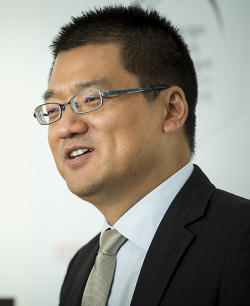Driving the Future: Opportunities and Challenges of Autonomous Vehicles
The Institute for AI International Governance of Tsinghua University, Globethics, Institute for Ethics in Artificial Intelligence (TUM)
Session 244
Autonomous driving technology has not only redefined modes of transportation, but also provided humanity with a brand-new digitalized living experience. As a brilliant fusion of artificial intelligence and the transportation sector, autonomous driving is heralding a revolutionary wave in global transportation systems. In this process, autonomous vehicles have evolved beyond mere transportation tools to become intelligent spaces integrating multimedia information interaction, serving as mobile nodes for data flow and information sharing.
This side-event, themed "Driving the Future: Opportunities and Challenges of Autonomous Vehicles", brings together representatives from academia, industry, international organizations, and independent bodies to jointly explore the developmental trajectory of autonomous driving technology, its industrialization challenges, and its profound significance in the blueprint of smart cities. The event aims to further promote the trusted and secure use of ICT technologies, represented by autonomous driving, by fostering broad consensus on the development, industrial application, and regulatory oversight of autonomous driving technology. It seeks to outline a feasible roadmap for industrial development and a regulatory framework for implementation, thereby advancing the informatization transformation and sustainable development of transportation and cities.
This event is closely aligned with WSIS Action Lines C5 (Building Confidence and Security in the Use of ICTs) and C6 (Enabling Environment). Specifically, the panel "The Future Path of Autonomous Driving: Opportunities & Challenges in Technological Development and Commercialization" corresponds to the actions outlined in WSIS Action Lines C5, paragraph 124. This panel will convene experts from the industry and technical fields to discuss feasible industrialization solutions for autonomous driving, further promoting the secure and trusted application of this technology. Meanwhile, the panel "The Global Landscape of Autonomous Driving Regulation: A Comparative Perspective from China, the US, and Europe" aligns with WSIS Action Lines C6, paragraph 163. This panel provides a platform for promoting dialogue and exchange on autonomous driving policies and regulations worldwide. Based on in-depth discussions, it supports the formulation and enhancement of policies and regulatory frameworks that align with the development trends of autonomous driving technology and industry, while fostering cross-regional and cross-sectoral regulatory cooperation.








-
 C1. The role of governments and all stakeholders in the promotion of ICTs for development
C1. The role of governments and all stakeholders in the promotion of ICTs for development
-
 C3. Access to information and knowledge
C3. Access to information and knowledge
-
 C4. Capacity building
C4. Capacity building
-
 C5. Building confidence and security in use of ICTs
C5. Building confidence and security in use of ICTs
-
 C6. Enabling environment
C6. Enabling environment
-
 C10. Ethical dimensions of the Information Society
C10. Ethical dimensions of the Information Society
-
 C11. International and regional cooperation
C11. International and regional cooperation
-
 Goal 1: End poverty in all its forms everywhere
Goal 1: End poverty in all its forms everywhere
-
 Goal 2: End hunger, achieve food security and improved nutrition and promote sustainable agriculture
Goal 2: End hunger, achieve food security and improved nutrition and promote sustainable agriculture
-
 Goal 3: Ensure healthy lives and promote well-being for all
Goal 3: Ensure healthy lives and promote well-being for all
-
 Goal 4: Ensure inclusive and equitable quality education and promote lifelong learning opportunities for all
Goal 4: Ensure inclusive and equitable quality education and promote lifelong learning opportunities for all
-
 Goal 5: Achieve gender equality and empower all women and girls
Goal 5: Achieve gender equality and empower all women and girls
-
 Goal 7: Ensure access to affordable, reliable, sustainable and modern energy for all
Goal 7: Ensure access to affordable, reliable, sustainable and modern energy for all
-
 Goal 8: Promote inclusive and sustainable economic growth, employment and decent work for all
Goal 8: Promote inclusive and sustainable economic growth, employment and decent work for all
-
 Goal 9: Build resilient infrastructure, promote sustainable industrialization and foster innovation
Goal 9: Build resilient infrastructure, promote sustainable industrialization and foster innovation
-
 Goal 10: Reduce inequality within and among countries
Goal 10: Reduce inequality within and among countries
-
 Goal 11: Make cities inclusive, safe, resilient and sustainable
Goal 11: Make cities inclusive, safe, resilient and sustainable
-
 Goal 12: Ensure sustainable consumption and production patterns
Goal 12: Ensure sustainable consumption and production patterns
-
 Goal 13: Take urgent action to combat climate change and its impacts
Goal 13: Take urgent action to combat climate change and its impacts
-
 Goal 14: Conserve and sustainably use the oceans, seas and marine resources
Goal 14: Conserve and sustainably use the oceans, seas and marine resources
-
 Goal 16: Promote just, peaceful and inclusive societies
Goal 16: Promote just, peaceful and inclusive societies
-
 Goal 17: Revitalize the global partnership for sustainable development
Goal 17: Revitalize the global partnership for sustainable development